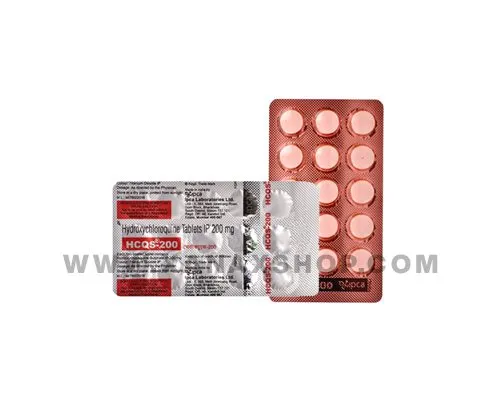Introduction: Hydroxychloroquine 200 mg Tablet
Hydroxychloroquine 200 mg tablet is used for the treatment or prevention of malaria. A disease is caused by a parasite that enters the body through a mosquito bite. Malaria is quite common in continents like Africa, Southern Asia, and South America. You should understand that this medicine does not work against all strains of malaria.
Hydroxychloroquine 200 mg tablet also helps in the treatment of discoid or systemic lupus erythematosus and rheumatoid arthritis.
Generic name: Hydroxychloroquine
Drug class: Antirheumatics, Antimalarial Quinolines
Warnings
It can cause fatal effects on your heart. Call for emergency medical attention, if you feel sudden dizziness and have fast or pounding heartbeats.
Taking hydroxychloroquine 200 mg tablet at high doses or for the long-term may result in irreversible damage to your retina that could give permanent vision problems.
Stop taking the medicine and call your doctor if you have trouble focusing, blind spots, blurred vision, distorted vision, trouble reading, increased sensitivity to light, or changes in your color vision.
Before Taking hydroxychloroquine 200 mg tablet
You should not use it if you are allergic to chloroquine or hydroxychloroquine.
To safely use hydroxychloroquine 200 mg tablet, tell your doctor if you have ever had:
Damage to your retina or vision changes caused by an anti-malaria medication;
Heart rhythm disorder or heart disease;
Diabetes;
Stomach disorder;
Allergy to quinine;
kidney or liver disease;
Psoriasis;
Alcoholism;
Porphyria; or
Glucose-6-phosphate dehydrogenase (G6PD) deficiency.
Malaria is very dangerous for pregnant women as it may cause serious illness or even death. Your doctor must know if you are pregnant or planning to conceive. If you suffer from malaria during pregnancy, it may increase the risk of low birth weight, premature delivery, stillbirth, and even miscarriage.
During pregnancy, ask your doctor about the possible risks of traveling to malaria-infected areas.
Ask your doctor before breastfeeding your baby, It may be risky.
This medicine is not approved for the treatment of rheumatoid arthritis or lupus in people younger than 18 years old.
How Should I Take Hydroxychloroquine?
Take the medicine exactly as prescribed by the doctor. Read the medication guide and follow the given directions.
Take hydroxychloroquine 200 mg with a glass of milk or meal unless the doctor tells you otherwise.
For the treatment of lupus or arthritis, it is usually taken daily.
To Prevent Malaria: Hydroxychloroquine must be taken once every week. Start taking the medication 2 weeks before you enter a malaria-infected area. Take the medicine regularly during your stay and till 4 weeks after your visit.
To Treat Malaria: Hydroxychloroquine 200 mg tablet is normally given as a single high dose the first time and two smaller doses for the next 2 days.
Take this medicine for the entire prescribed period, even if the symptoms are going away.
If you have been infected with malaria, contact the doctor immediately. Use insect repellents, protective clothing, and mosquito netting to be safe from malaria.
There is no 100% effective medication for the prevention or treatment of all types of malaria. Talk to your doctor if you suffer vomiting, have a fever, or have diarrhea during the treatment.
During the treatment from hydroxychloroquine 200 mg tablet, you may need regular vision exams and medical tests.
Store the medicine at room temperature away from light, moisture, and heat.
What Happens If I Overdose?
Seek immediate emergency medical help or call your local poison control center. An overdose of hydroxychloroquine 200 mg must be treated quickly as it can be fatal.
Overdose symptoms of the medicine are seizure, drowsiness, slow heart rate, vision changes, weak pulse, sudden dizziness, pounding heartbeats, shortness of breath, fainting, or slow breathing (breathing may stop).
What To Avoid
This medicine may impair your reactions and cause blurred vision. Ignore driving or high-risk activity before analyzing the medicine’s effect on your body.
Do not take Kaopectate or an antacid within 4 hours before or after you take hydroxychloroquine 200 mg tablet.
Hydroxychloroquine 200 mg tablet Side Effects
Medical help is required if you have suffered from an allergic reaction to hydroxychloroquine 200 mg tablet (difficult breathing, hives, swelling in your face or throat) or a serious skin reaction (skin pain, fever, burning eyes, sore throat, purple or red skin rash with blistering and peeling).
Seek emergency medical attention, in case you encounter symptoms of a severe heart problem: pounding or fast heartbeats, shortness of breath, fluttering in your chest, and sudden dizziness.
Call your doctor if you have:
A seizure;
Yellowing of your eyes;
Trouble hearing, ringing in your ears;
Unusual mood changes;
Underactive reflexes, loss of coordination, severe muscle weakness;
Low Blood Cell Counts – chills, fever, tiredness, mouth sores, sore throat, easy bruising, pale skin, unusual bleeding, cold hands and feet, feeling short of breath or light-headed;
Low Blood Sugar – hunger, headache, sweating, dizziness, irritability, fast heart rate, and feeling shaky or anxious; or
A serious drug reaction affects multiple parts of your body – fever, skin rash, muscle aches, swollen glands, unusual bruising, severe weakness, or yellowing of your skin or eyes.
Common side effects may include:
Dizziness, headache;
Vomiting, nausea, stomach pain;
Weight loss, loss of appetite;
Feeling nervous or irritable;
Itching or skin rash; or
Hair loss.
Effect of Other Drugs With Hydroxychloroquine?
It can cause a fatal heart problem. Your risk may be increased if you also use some other medicines for asthma, infections, heart problems, depression, high blood pressure, cancer, mental illness, malaria, or HIV. Tell your doctor about all your other medicines.

Reviews
There are no reviews yet.